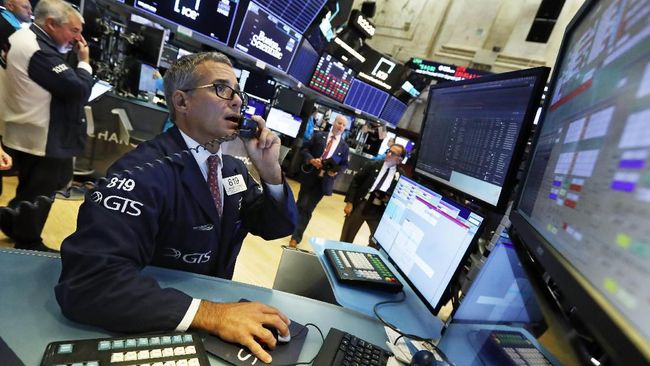Jakarta, CNBC Indonesia – In line with increasing concerns about inflation and the geopolitical situation, the Wall Street stock market lost again in Friday’s trading. The decline in shares of major banks also put additional pressure on the market.
The Dow Jones Industrial Average fell 475.84 points, or 1.24%, to close at 37,983.24. The S&P 500 slipped 1.46% to 5,123.41. Meanwhile, the Nasdaq Composite fell 1.62% to 16,175.09.
In a week, the S&P 500 fell 1.56%, while the Dow Jones fell 2.37%. On the other hand, the technology-dominated Nasdaq fell 0.45% this week.
JPMorgan Chase shares fell more than 6% after the banking giant released its first-quarter results. The bank said net interest income, a key measure of profit levels, was slightly below Wall Street analysts’ estimates for 2024. CEO Jamie Dimon also warned of persistent inflationary pressures on the economy. Wells Fargo fell 0.4% after reporting its latest quarterly numbers.
This sentiment can be a positive and negative signal for the domestic capital market. The slowdown in the US banking sector, which supports its economy, indicates an economic slowdown in the global economy. This can be a positive signal for financial markets, especially given the potential for greater interest rate cuts in the future.
On the other hand, this also shows that the real conditions in the first quarter of the US economy showed a slowdown. The decline in banking performance can also be a concern for investors that this problem can spread to various economic sectors, so that it can have a domino effect that threatens the economy.
Further sentiment regarding oil prices continues to rise as Israel prepares for a direct attack by Iran this weekend, in what would be the biggest escalation of tensions in the region since the outbreak of the Israel-Hamas war last October. US crude oil settled at US$85.66 per barrel after briefly rising above US$87.
This, coupled with new US import data, added fuel to inflation concerns that have been putting pressure on markets.
“We see risk sentiment weakening towards the end of the week. There seems to be a trade towards safety, with the dollar strengthening, and we see stocks down,” said Rob Haworth, senior investment strategist at US Bank Wealth Management.
“This comes on the heels of inflation data telling us that the economy is still quite hot and inflation is still subdued; that’s what’s encouraging [investor] to actually adjust their expectations of the Fed. … That’s part of the reason why they’re being wary heading into the weekend,” Haworth added.
The increase in oil prices can be a positive indicator for the JCI, considering that the energy sector is one of the pillars of market movements. There have been many increases in oil stock prices, both in the US and domestic markets.
However, rising oil prices could be bad news for industries that use a lot of oil. High oil prices can cause industry to have to pay more, so that expenses will increase. In addition, rising oil prices could result in uncontrolled inflation, so interest rate cuts will still be postponed.
CNBC INDONESIA RESEARCH
[email protected]
(mza)
[Gambas:Video CNBC]
2024-04-14 03:00:08
#Wall #Street #Collapses #Due #IsraelIran #War #Prospects #JCI


